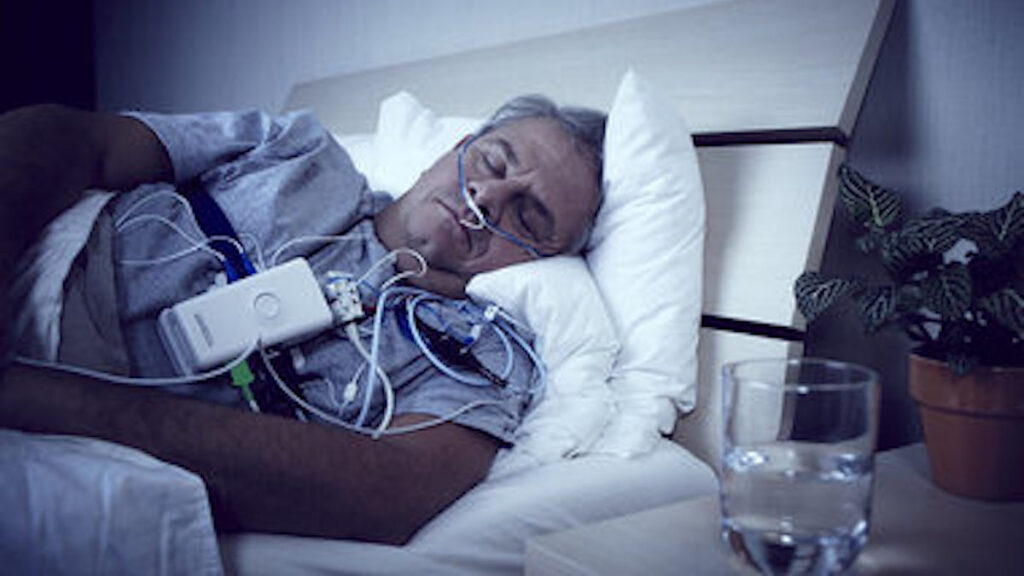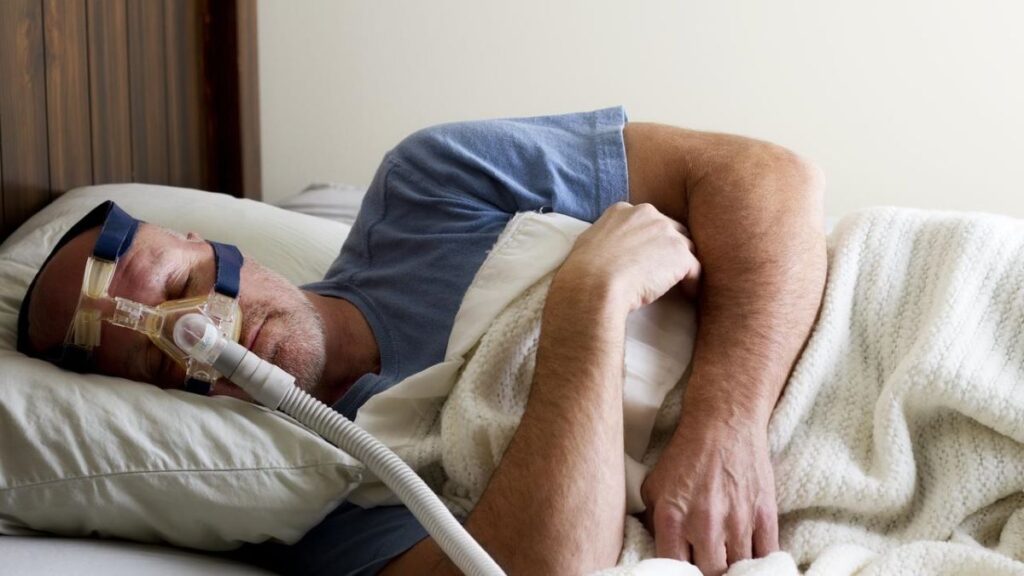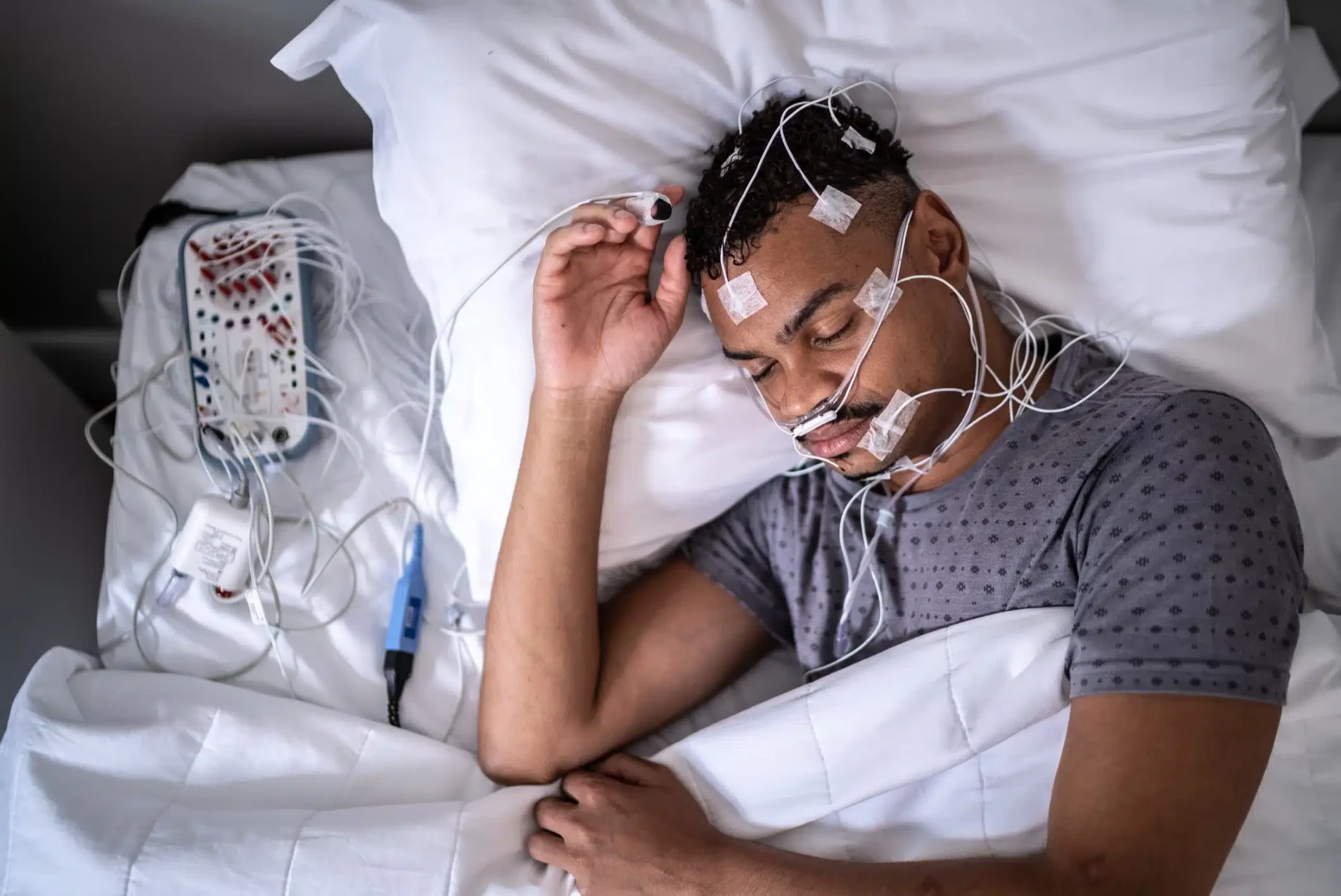What is a Sleep Study and Why is it Needed?
A sleep study is a comprehensive diagnostic test that monitors your sleep patterns, breathing, and various bodily functions throughout the night. During this non-invasive procedure, medical professionals record data about your brain waves, heart rate, oxygen levels, and breathing patterns to identify potential sleep disorders that may be disrupting your rest.
Sleep studies serve as the primary diagnostic tool for detecting several common sleep conditions:
- Sleep apnoea – characterised by repeated breathing interruptions during sleep
- Insomnia – persistent difficulty falling or staying asleep
- Narcolepsy – excessive daytime sleepiness and sudden sleep attacks
- Restless leg syndrome – uncomfortable sensations causing leg movement
- Periodic limb movement disorder – involuntary leg jerking during sleep
You might need a sleep study if you experience persistent symptoms that suggest an underlying sleep disorder. The most common indicators include:
- Loud, chronic snoring that disrupts your partner’s sleep
- Excessive daytime fatigue despite adequate sleep time
- Morning headaches or dry mouth upon waking
- Difficulty concentrating or memory problems
- Witnessed breathing pauses during sleep
- Frequent night-time awakenings or restless sleep
These symptoms often point to sleep apnoea, which affects millions of Australians and can lead to serious health complications if left untreated. Early diagnosis through a sleep study enables you to access appropriate treatment options and improve your quality of life significantly.
What Types of Sleep Studies Are Available in Australia?
Australia offers two primary types of sleep studies that cater to different diagnostic needs and patient preferences. Understanding the distinction between in-lab vs home sleep study options helps you make an informed decision about which approach suits your situation best.
Level 1 Studies (In-Lab/Hospital-Based)
Level 1 studies take place in specialised sleep laboratories within hospitals or dedicated sleep centres. During these comprehensive assessments, you’ll spend the night in a controlled environment whilst technicians monitor multiple physiological parameters including brain waves, eye movements, muscle activity, heart rhythm, and breathing patterns.
Benefits of in-lab studies:
- Complete monitoring of all sleep stages and disorders
- Immediate technical support if equipment malfunctions
- Ability to diagnose complex sleep disorders beyond sleep apnoea
- Real-time adjustments to equipment settings
Limitations include:
- Higher costs due to facility and staffing requirements
- Potential sleep disruption from unfamiliar environment
- Limited availability requiring advance booking
- Travel requirements for regional patients
Level 2 Studies (Home-Based)
Home-based sleep studies allow you to undergo testing in your familiar bedroom environment using portable monitoring devices. These studies focus primarily on detecting sleep apnoea through respiratory monitoring, oxygen levels, and basic sleep metrics.
Home study advantages:
- Natural sleep environment promotes typical sleep patterns
- Significantly lower costs
- Greater convenience and accessibility
- Reduced waiting times for appointments
Limitations encompass:
- Limited diagnostic scope compared to comprehensive lab studies
- Potential for equipment displacement during sleep
- No immediate technical assistance available
How Much Does a Sleep Study Cost in Australia?
Understanding the cost of sleep studies in Australia varies significantly depending on the type of test you choose and your location. The price range for sleep tests reflects the different levels of monitoring and clinical oversight involved.
In-Lab Sleep Studies
In-lab sleep studies typically range from $500 to $1,000 for the complete diagnostic process. These comprehensive overnight assessments conducted in hospital sleep centres or dedicated facilities include:
- Professional monitoring throughout the night
- Advanced polysomnography equipment
- Immediate technical support if issues arise
- Detailed analysis by qualified sleep technologists
Home-Based Sleep Studies
Home-based sleep studies offer a more budget-friendly alternative, with costs ranging from $149 to $400. This price variation depends on several factors:
- The complexity of monitoring equipment provided
- Duration of the study period
- Level of professional interpretation included
- Additional support services offered
Cost Considerations for Patients
Private patients without Medicare coverage face the full cost burden, whilst those with appropriate referrals may access significant rebates. The price difference between study types reflects the varying levels of clinical infrastructure required – in-lab studies demand specialised facilities and overnight staffing, whereas home studies utilise portable monitoring devices that you operate independently.
You should consider both the upfront costs and potential long-term savings when choosing between study types, as accurate diagnosis leads to appropriate treatment that can prevent costly health complications down the track.
What Factors Influence the Cost of a Sleep Study?
Several key factors affecting sleep study cost determine what you’ll pay for your diagnostic testing in Australia. Understanding these variables helps you make informed decisions about your sleep health investment.

1. Test Type
The type of test you undergo is the main factor affecting the cost. In-laboratory studies are more expensive because they involve complex monitoring equipment and require a technician to supervise overnight. These detailed assessments can cost anywhere between $500 and $1,000. On the other hand, home-based studies are generally cheaper, ranging from $149 to $400, as they need less infrastructure and staff.
2. Location
Pricing varies significantly depending on where you live. Sleep clinics in metropolitan areas usually charge higher rates compared to those in regional areas. Private hospitals and specialised sleep centres may have higher fees than public facilities or community-based services.
3. Insurance Coverage
The amount covered by insurance for sleep tests can vary greatly based on your specific policy and provider. Medicare provides rebates for diagnostic tests that meet MBS guidelines when you obtain proper medical referrals. Private health insurers may offer partial coverage under specific packages, particularly for CPAP therapy components.
4. Complexity of Your Condition
The severity of your condition affects the type of tests required. Simple screenings for sleep apnoea are less expensive than comprehensive studies that investigate multiple sleep disorders. If additional monitoring parameters, extended recording periods, or specialised equipment are needed, overall costs will increase.
5. Provider Partnerships
Pricing structures can also be influenced by partnerships between providers and equipment manufacturers. Companies like Air Liquide Healthcare use their extensive networks through brands such as Healthy Sleep Solutions and Complete Care to offer competitive rates across Australia’s diverse healthcare landscape.
How Can Patients Budget for a Sleep Study in Australia?
Budgeting for medical tests Australia requires strategic planning, particularly when it comes to sleep studies. You can significantly reduce your financial burden by understanding the Medicare system and preparing properly for your diagnostic journey.
1. Get a GP Referral
Securing a proper GP referral represents your first step towards reducing out-of-pocket expenses sleep study. Medicare provides substantial rebates for sleep studies when you obtain an appropriate referral from your general practitioner or specialist. Without this referral, you’ll face the full cost of the study, which can range from $149 to $1,000 depending on the type and location.
Your doctor needs to document specific symptoms and medical indications that justify the sleep study. These typically include:
- Witnessed breathing interruptions during sleep
- Excessive daytime sleepiness affecting daily activities
- Loud, persistent snoring
- Morning headaches or dry mouth
- Difficulty concentrating due to poor sleep quality
2. Time Your Referral Wisely
Timing your referral strategically can also impact costs. Some providers offer bulk-billing arrangements for Medicare-eligible patients, meaning you pay nothing out-of-pocket for qualifying home sleep studies. You should discuss bulk-billing options with your chosen provider before booking your appointment.
3. Check Your Private Health Insurance Coverage
Private health insurance coverage varies significantly between funds and policies. Contact your insurer to understand what sleep study costs they cover and whether you need to use specific providers or facilities to maximise your benefits.
What Services Are Included Beyond the Sleep Study?
Your sleep study is just the first step towards improving your sleep health. Post-diagnosis treatment options go beyond the initial assessment and include comprehensive care programmes designed to treat your specific sleep disorder.
CPAP Therapy Initiation Programmes
CPAP therapy initiation programmes are a crucial part of treatment for sleep apnoea patients. Air Liquide Healthcare offers structured services that guide you through the important first weeks of therapy. These programmes include:
- Equipment setup and fitting – Professional technicians ensure your CPAP mask and machine are properly configured
- Initial adjustment period support – Regular check-ins during your first month to address comfort issues
- Pressure titration programmes – Fine-tuning your machine’s pressure settings for optimal therapy effectiveness
The titration process is particularly valuable because your pressure needs may change as you get used to treatment. Providers monitor your therapy data remotely and make adjustments without requiring extra clinic visits.
Ongoing Therapy Guidance
Ongoing therapy guidance includes educational resources about mask maintenance, troubleshooting common issues, and recognising signs that indicate equipment adjustments are needed. You’ll have access to dedicated support teams who understand the difficulties of getting used to CPAP therapy.
Regular follow-up appointments track your progress and make sure your treatment stays effective in the long run. These comprehensive support services turn your initial sleep study investment into a complete health management solution. You may like to visit https://catchingyourbreath.com/sleep-study-sydney-what-to-expect-and-how-it-works/ to get what to expect from sleep study sydney and how it works.
What Should Patients Expect During a Sleep Study?
Preparing for a sleep study requires careful attention to your routine in the days leading up to the test. You should avoid alcohol, caffeine, and sedating medications for at least 24 hours before your study, as these substances can significantly alter your natural sleep patterns and compromise the accuracy of your results.
Your sleep specialist will provide specific instructions tailored to your situation, but general preparation includes:
- Maintain your regular sleep schedule for several days before the test
- Avoid daytime naps on the day of your study
- Take your usual medications unless specifically instructed otherwise
- Shower and wash your hair before the test, avoiding conditioners or styling products that might interfere with electrode placement
What happens during home sleep test procedures varies depending on whether you’re completing an in-lab or home-based study. For home studies, you’ll receive a portable monitoring device with clear instructions for setup. The equipment typically includes sensors for your chest, finger, and nasal area to monitor breathing patterns, oxygen levels, and heart rate throughout the night.
In-lab studies involve more comprehensive monitoring with additional sensors attached to your scalp, face, and legs. Sleep technicians will be present to ensure proper equipment function and can adjust settings if needed during the night. You’ll sleep in a comfortable, hotel-like room designed to promote natural sleep despite the monitoring equipment.

How Do Location and Provider Partnerships Affect Accessibility and Cost?
Regional differences in healthcare costs Australia significantly impact sleep study accessibility, with metropolitan areas typically offering more competitive pricing due to higher provider density. Rural and remote locations often face premium charges due to limited service availability and higher operational costs.
Strategic partnerships between sleep study providers and CPAP manufacturers create extensive networks that bridge these geographical gaps. Air Liquide Healthcare operates Australia’s largest sleep study network through partnerships with established brands including:
- Healthy Sleep Solutions – providing comprehensive coverage across major cities
- Complete Care – specialising in regional service delivery
- SNORE Australia – focusing on accessible home-based testing
- Mycroft and Sleep Disorder Australia (SDCA) – expanding reach to underserved areas
These partnerships enable standardised pricing structures across different locations, reducing the typical cost variations you might expect between urban and regional centres. The collaborative approach allows smaller regional providers to access bulk purchasing agreements and shared resources, keeping costs competitive.
Network benefits include:
- Consistent service quality regardless of location
- Streamlined referral processes between providers
- Shared expertise and training programmes
- Coordinated follow-up care across different regions
Provider partnerships with CPAP manufacturers also create integrated care pathways, where your diagnostic results seamlessly connect to treatment options, reducing both time delays and additional consultation fees that might otherwise accumulate across multiple independent providers.
Conclusion
Understanding the cost of sleep studies in Australia: what to expect and how to budget becomes manageable when you understand your options and available support systems. You can significantly reduce your out-of-pocket expenses by securing a proper doctor’s referral to access Medicare rebates for diagnostic tests meeting MBS guidelines.
Planning for health expenses in Australia requires proactive research into provider networks and partnerships. Companies like Air Liquide Healthcare, through their extensive network including Healthy Sleep Solutions and Complete Care, offer competitive pricing and comprehensive care pathways that streamline both diagnosis and treatment.
Understanding medical test costs empowers you to make informed decisions about your sleep health. Home-based studies starting from $149 provide accessible entry points, whilst in-lab studies offer comprehensive monitoring when clinically necessary.
Early diagnosis transforms your quality of life and prevents serious health complications associated with untreated sleep disorders. Sleep apnea, left undiagnosed, increases risks of cardiovascular disease, diabetes, and workplace accidents. You deserve restorative sleep, and with proper budgeting and provider selection, quality sleep study services remain within reach across Australia’s healthcare landscape.

